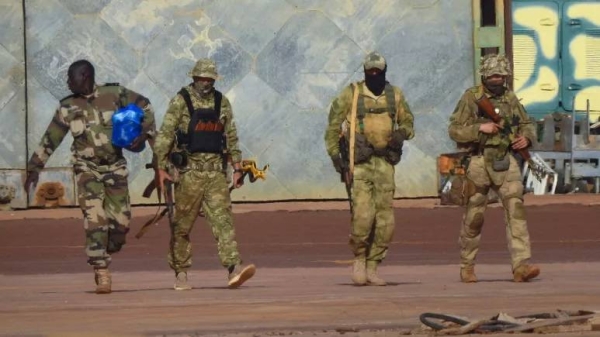
Russian mercenaries in Mali have been accused of a new massacre of civilians following a major military operation in the centre of the unstable country.
At least 13 civilians were killed on Sunday in the region of Mopti by Malian troops supported by “white soldiers”, local elected officials and an official of a community association told the Agence France-Presse.
Fighters from the Kremlin-linked Wagner Group arrived in Mali late last year after a lucrative deal was struck with its new military rulers. They have been deployed on a series of offensives against Islamist extremists who control swaths of the country and have been repeatedly linked to atrocities.
The reported massacre appears to have occurred during a large-scale airborne operation in a region known as a stronghold for extremist groups. Airstrikes were followed by a ground assault by Malian troops and suspected Wagner fighters near the town of Tenenkou, local sources said.
“On Sunday in Guelledjé [near] Tenenkou … the Malian military came in force with white soldiers. There was shooting and arrests. At least 13 people were killed,” a local politician told AFP.
The information was confirmed by another local official. Those killed included a woman, her daughter and her granddaughter, the source said. A resident of Guelledjé said the village was attacked because “the army and the white soldiers of Wagner consider it to be an Islamist extremist stronghold”.
An official of Tabital Pulakuu, an association for the promotion of the culture of Mali’s Peuhl ethnic groups, told AFP that “more than 20 civilians were killed and arrested on Sunday in Guelledjé”, all from the Peuhl community. “Not all Peuhl are jihadists,” the official said. “Those who were killed are innocent civilians.”
Extremist Islamist factions have sought to recruit among the pastoralist Peuhl by exploiting grievances with the government and other ethnic groups. According to survivors, many of the civilians killed in a series of massacres in Mali linked to Wagner earlier this year were all from the Peuhl community.
Mali’s military rulers, who took power in a coup in May last year, have said the thousand or more Russian paramilitaries in the country are instructors and not deployed in combat roles. A source “categorically” denied the reports of a new massacre, AFP reported. In previous incidents, Mali’s armed forces have said that only terrorists had been “neutralised” during “vigorous” security operations.
The new offensive by Mali’s military and Wagner comes after gains by Islamist militants earlier this month. Fighters from groups linked to the Islamic State seized territory in the east, killing hundreds of civilians and forcing thousands to flee, regional Malian officials and analysts said.
The gains by the militants highlight Mali’s struggle to fill the vacuum left after the departure of French and other European forces, while relations with neighbouring Niger have deteriorated, preventing joint military operations near the Niger and Burkina Faso borders.
Growing acrimony between western powers and military leaders who seized power in a 2020 coup pushed France to move its counter-insurgency operations to Niger this year.
Other European countries have withdrawn troops, often citing Mali’s collaboration with Russian mercenaries.
In the east of Mali, national troops and the few remaining international forces that back them are increasingly confined to the towns that host their bases.
Wagner has been active in a dozen countries across Africa, and it has been repeatedly accused of human rights abuses on the continent. In May a Human Rights Watch report alleged that forces in Central African Republic (CAR) identified as Russian appeared to have killed and tortured civilians since 2019, echoing similar findings from a group of UN experts last year. Wagner has also taken part in the invasion of Ukraine and been linked to atrocities there.
According to the Armed Conflict Location and Event Data Project, a non-profit that tracks violence across the world, Wagner’s deployment in Mali has “entailed mass atrocities, torture, summary executions, looting, the introduction of booby traps as a counter-insurgency tactic, and influence operations in the information environment”.
The military that took power by force in Mali in 2020 has turned away from the French ally and its partners for the past year, and looked to Russia. The government claims to have reversed the security trend and defeated the jihadist groups.
Victoria Nuland, US undersecretary of state for political affairs, said last week terrorism had become significantly worse since Wagner had deployed to Mali.
“Terrorism is going up, not down, and we are firmly of the view that Wagner works for itself, not for the people of the country that it comes to,” Nuland said.












